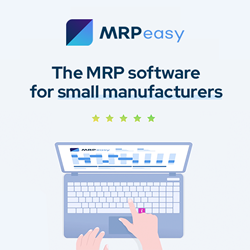Just as companies like GM and Amazon have leveraged AI in their factories and warehouses, respectively, to enhance production and streamline operations, businesses can now apply advanced AI agents for even greater efficiencies and profits.
 Innovating Manufacturing and Supply Chains with Agentic AI
Innovating Manufacturing and Supply Chains with Agentic AI

Ashish Kumar, Assistant Vice President of Operations | Chetu
More than a half-century after the first industrial robot — the Unimate 1900 —revolutionized the auto industry, AI agents are poised to have a greater transformative impact in the manufacturing sector because they think for themselves.
Just as companies like GM and Amazon have leveraged AI in their factories and warehouses, respectively, to enhance production and streamline operations, businesses can now apply advanced AI agents for even greater efficiencies and profits.
Operational challenges make it essential for companies to implement better innovative solutions. McKinsey reports that AI-powered supply chain management can save inventory expenses by 35% and logistics costs by 15%. Moving past conventional AI, advanced AI agents autonomously adapt to dynamic situations and proactively address issues faster and more accurately.
However, adopting these agentic systems poses several challenges. Businesses face the task of seamlessly integrating them into their infrastructure, protecting sensitive data, and training employees to operate alongside these technologies.
AI Agents: Breaking Barriers of Traditional AI
AI agents are intelligent software tools designed to perform tasks without constant human input. They leverage data, machine learning, reinforcement learning, and real-time monitoring to optimize various processes within manufacturing. These agents excel at production scheduling, inventory management, predictive maintenance, and quality assurance tasks without oversight. They analyze data from multiple sources in real time to adapt dynamically.
Manufacturing
Dynamic process optimization improves efficiency and decreases waste as AI agents modify production parameters in real time and recognize defects by leveraging computer vision and machine learning algorithms.
According to Deloitte, predictive maintenance may boost equipment uptime by 10-20% and cut down on planning time by up to 50%. This underscores the significance of efficiently leveraging AI and preventing unanticipated machinery failures by proactively scheduling maintenance.
Supply Chain Management
To anticipate demand fluctuations, AI agents analyze market trends, historical patterns, and customer behavior. By automating supply chain operations, AI agents can efficiently help businesses manage production, inventory, and procurement without human intervention, which can ease labor demands.
A prime example is Amazon, which employs AI agents. The company leverages the reasoning capabilities of foundation models along with APIs and data, to analyze user requests, retrieve pertinent information, and execute tasks effectively, allowing teams to dedicate their efforts to more strategic, high-value activities.
The Technology Powering AI Agents
AI agents rely on advanced technologies:
- Machine Learning Models enable AI agents to analyze vast amounts of data, recognize patterns, and make predictions.
- IoT and Edge Devices allow AI agents to act instantly by using sensors that collect real-time data from machines and supply chains.
- Cloud and Edge Computing provide scalability and low-latency decision-making at the source.
- Data Integration Platforms unify access to manufacturing, supply chain, and customer data.
- Cybersecurity Measures are crucial for data integrity to prevent sabotage.
Vendor Solutions Vs. Custom Software Solutions
When planning to incorporate agentic AI into workflows, organizations have several options: vendor products, custom-built software solution, or a hybrid model. Each offers distinct advantages and challenges.
Products’ Advantages & Limitations
- These solutions benefit from economies of scale, offering lower upfront costs.
- They come with an established track record of performance due to wide usage across industries.
- It may have a faster implementation timeline and include a monthly subscription.
Vendor solutions can address specific business problems, but compatibility issues with legacy systems can hinder efficiency and adaptation to evolving operations.
Custom AI Solutions Advantages & Challenges
- These are created to align with a company’s unique needs and ensure they are an excellent operational fit.
- Tailor-made software solutions, which may have a larger initial investment and longer development time, align with existing infrastructures, avoiding the compatibility issues sometimes seen with vendor solutions.
- This solution offers long-term value and lower costs going forward, supporting future growth as it is adaptable to new business dynamics.
Hybrid Approach
Trusted and vetted software solution providers are also able implement and integrate a vendor platform, customizing it to meet your demands. Choosing any of these solutions depend on your priorities, assets, and growth plan.
AI Agents Implementation Challenges
Adopting AI agents comes with several obstacles. Some infrastructures may not have enough power for complex tasks and scaling them across large operations adds to the technological constraints. Data issues, such as siloed systems and the need for accurate information, make integration harder. Concerns over potential job displacement and the demand for skilled individuals to manage these systems offer more challenges. Ethical and security issues require AI agents to make unbiased decisions and safeguard sensitive data.
The Future of AI Agents in Manufacturing and Supply Chains
According to Market Research Reports, the agentic AI sector should have a Compounded Annual Growth Rate of 35% through 2029, with a market size increasing from $28.29 billion in 2024 to $126.89 billion by the end of the decade.
Industries understand AI agents are paving the way for autonomous smart factories and streamlined workflows across global supply chains, minimizing energy consumption and waste.
AI Agents Powering the Future of Industry
Manufacturing and supply chain management are going through a major digital transformation with the integration of autonomous, adaptable, and proactive AI agents. Despite challenges like integration, workforce adjustment, and security concerns, the lasting benefits may far exceed the drawbacks.
Organizations utilizing AI agents are streamlining operations while setting the stage for a future of autonomous intelligent industries. By embracing AI agents as collaborators rather than just tools, businesses are poised to drive the next industrial revolution.
 Ashish Kumar, Assistant Vice President of Operations at Chetu, a global software solutions and support services provider, oversees multiple portfolios including Retail, Manufacturing, Energy, IT Service Management, Supply Chain and projects that require Artificial Intelligence/Machine Learning expertise. Ashish, who has worked at Chetu for more than 15 years, is a certified AWS Solution Architect, Project Management Professional, and Scrum Master.
Ashish Kumar, Assistant Vice President of Operations at Chetu, a global software solutions and support services provider, oversees multiple portfolios including Retail, Manufacturing, Energy, IT Service Management, Supply Chain and projects that require Artificial Intelligence/Machine Learning expertise. Ashish, who has worked at Chetu for more than 15 years, is a certified AWS Solution Architect, Project Management Professional, and Scrum Master.
The content & opinions in this article are the author’s and do not necessarily represent the views of ManufacturingTomorrow
Comments (0)
This post does not have any comments. Be the first to leave a comment below.
Featured Product

